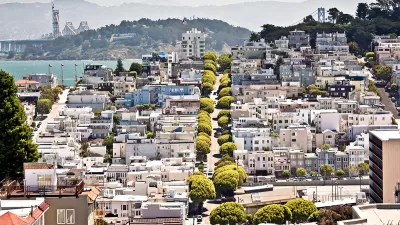The Sierra Club has opposed an ordinance passed by the San Francisco Board of Supervisors that allows developers to add spaces above parking limits if they're dedicated to car-share vehicles. Does the plan violate the city's Transit First policy?
Isabel Angell reports on the recent Bay Area kerfuffle that pits environmentalists against car-share advocates. Proposed by Supervisor Scott Wiener, the plan that recently passed the board allows residential developers to "add more parking spots to their new apartment buildings–- if those spots are dedicated for car-share programs."
While the ordinance passed unanimously, the outspoken opposition from the Sierra Club surprised some. "In a letter, Sierra Club secretary Sue Vaughan said the plan 'will add to overall congestion and negatively impact the flow of transit and air quality.'” The ordinance does seem to run counter to the city's aim of limiting the amount of parking allowed in new buildings.
"Instead of making new parking spots for car-share programs, The Sierra Club suggested converting existing street parking spots," adds Angell. "But Supervisor Wiener’s office countered by offering studies that show each new car share vehicle replaces between eight and ten private cars. In fact, a UC Berkeley study found that after signing up with a car-sharing program, almost half of households with a car got rid of their vehicle."
"The San Francisco Supervisors hope that developers will take advantage of these new car-share spots," she concludes. "So do the city’s car-share members, who are seeing their usual spots at gas stations and open-air lots disappear as they get converted into buildings and other uses."
FULL STORY: Car Share Parking Attracts an Unlikely Foe in San Francisco

Maui's Vacation Rental Debate Turns Ugly
Verbal attacks, misinformation campaigns and fistfights plague a high-stakes debate to convert thousands of vacation rentals into long-term housing.

Planetizen Federal Action Tracker
A weekly monitor of how Trump’s orders and actions are impacting planners and planning in America.

San Francisco Suspends Traffic Calming Amidst Record Deaths
Citing “a challenging fiscal landscape,” the city will cease the program on the heels of 42 traffic deaths, including 24 pedestrians.

Defunct Pittsburgh Power Plant to Become Residential Tower
A decommissioned steam heat plant will be redeveloped into almost 100 affordable housing units.

Trump Prompts Restructuring of Transportation Research Board in “Unprecedented Overreach”
The TRB has eliminated more than half of its committees including those focused on climate, equity, and cities.

Amtrak Rolls Out New Orleans to Alabama “Mardi Gras” Train
The new service will operate morning and evening departures between Mobile and New Orleans.
Urban Design for Planners 1: Software Tools
This six-course series explores essential urban design concepts using open source software and equips planners with the tools they need to participate fully in the urban design process.
Planning for Universal Design
Learn the tools for implementing Universal Design in planning regulations.
Heyer Gruel & Associates PA
JM Goldson LLC
Custer County Colorado
City of Camden Redevelopment Agency
City of Astoria
Transportation Research & Education Center (TREC) at Portland State University
Jefferson Parish Government
Camden Redevelopment Agency
City of Claremont





























